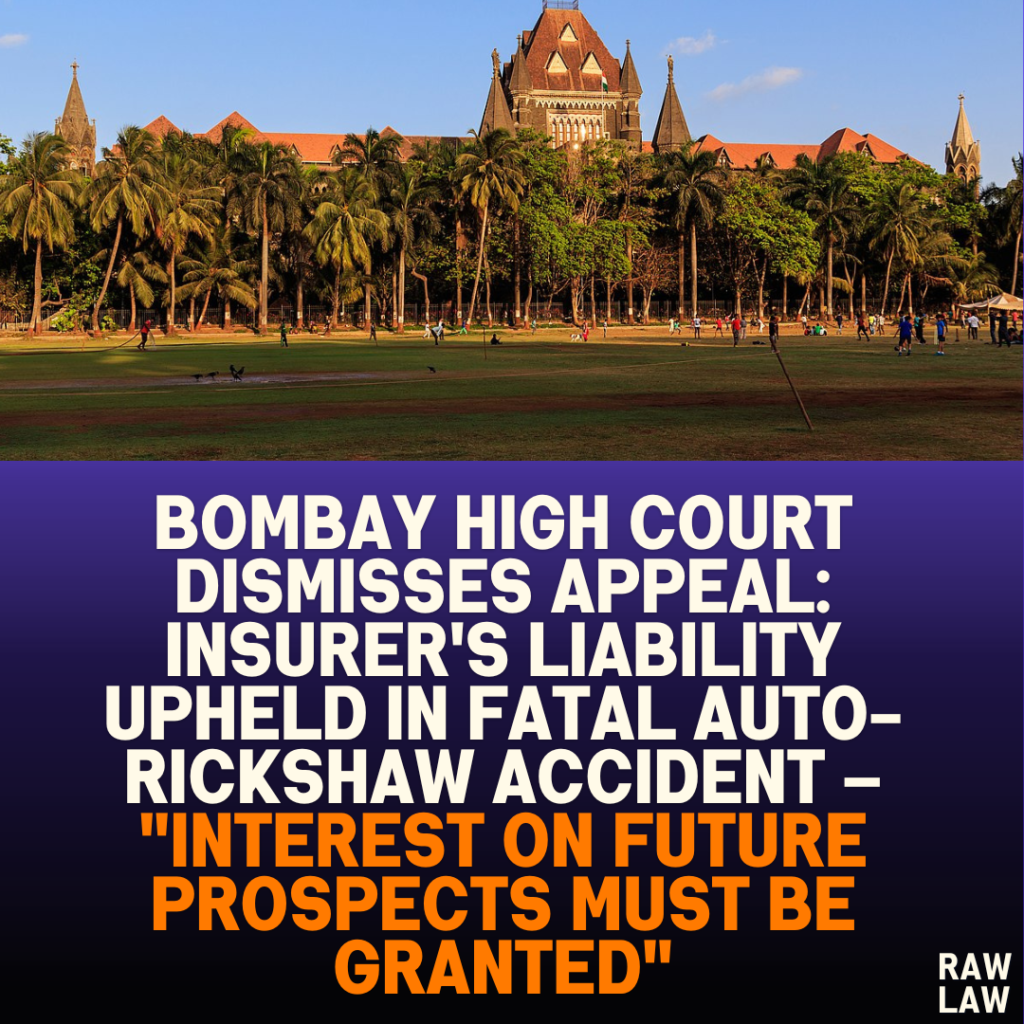Court’s Decision:
The Bombay High Court dismissed the appeal filed by the insurance company challenging the compensation awarded to the dependents of a deceased auto-rickshaw driver. The court upheld the Motor Accident Claims Tribunal’s (MACT) decision, ruling that the insurance company was liable to pay compensation amounting to ₹18,82,800 with 7.5% interest per annum from the date of filing the claim petition till its realization. The High Court rejected the insurance company’s contention that interest should not be paid on future prospects and emphasized that, “The Hon’ble Supreme Court has consistently granted interest on future prospects from the date of filing of the claim petition.”
Facts:
The deceased, an auto-rickshaw driver, met with a fatal accident on July 23, 2008, when a truck coming from the opposite direction in high speed collided head-on with his vehicle. The accident occurred around 3 a.m., and the impact was so severe that the driver died on the spot. The deceased was driving his rickshaw moderately on the left side of the road, and his friend Bapu Baban Thorat, who was following behind in another rickshaw, witnessed the incident. An FIR was registered against the truck driver, who fled the scene. The deceased left behind his widow, two minor daughters, one minor son, and his elderly parents, who subsequently filed a claim for compensation before the MACT, Osmanabad.
Issues:
The primary issue was whether the truck driver was solely negligent in causing the accident and whether the compensation awarded should include interest on future prospects.
Petitioner’s Arguments:
The insurance company argued that the responsibility for the accident should be apportioned between both drivers as it was a head-on collision. They further contended that 30% of the income should be deducted towards income tax and relied on various judgments, including Ranjana Prakash & Ors. vs. Divisional Manager & Anr. and Kalpana Madhu Gavali vs. Maharashtra State Road Transport Corporation, to assert that interest should not be granted on future prospects. They argued that the compensation should be revised by excluding interest on future earnings.
Respondent’s Arguments:
The claimants maintained that the deceased was driving his rickshaw at a moderate speed on the left side, and the truck, which was being driven rashly, veered onto their side of the road, resulting in the collision. They argued that the insurance company was liable to pay the full compensation as awarded by the MACT, including interest on future prospects.
Analysis of the Law:
The court analyzed various precedents, including the Supreme Court’s decisions in Magma General Insurance Co. Ltd. vs. Nanu Ram Alias Chuhru Ram, Sandhya Educational Society & Anr. vs. Union of India, and R. Valli & Ors. vs. Tamil Nadu State Transport Corporation Ltd., where it was consistently held that compensation for future prospects is calculated from the date of filing of the claim petition and interest is applicable on the entire amount, including future prospects.
Precedent Analysis:
The court observed that in Magma General Insurance Co. Ltd. vs. Nanu Ram Alias Chuhru Ram & Ors., the Hon’ble Supreme Court had granted interest on future prospects. Similarly, in Jitendra Khimshankar Trivedi & Ors. vs. Kasam Daud Kumbhar & Ors., the Supreme Court awarded interest on the enhanced amount, including future prospects and consortium, from the date of filing the claim petition. Thus, the High Court refused to apply the contrary view laid down by a previous High Court ruling in Kalpana Madhu Gavali vs. Maharashtra State Road Transport Corporation.
Court’s Reasoning:
The court reasoned that the deceased’s rickshaw was on the left side of the road and there was no evidence to prove contributory negligence. The insurance company’s arguments regarding deductions towards maintenance and income tax were dismissed as irrelevant in the context of the deceased’s income bracket. Additionally, the court emphasized that the compensation awarded must be just and reasonable, and in this case, the claimants deserved the enhanced amount as calculated by the MACT.
Conclusion:
The High Court upheld the MACT’s findings that the truck driver was solely responsible for the accident and dismissed the insurance company’s appeal, enhancing the compensation to ₹18,82,800, including interest on future prospects. The insurance company was directed to deposit the enhanced amount with interest within eight weeks.
Implications:
This judgment reaffirms the principle that interest on future prospects is integral to just compensation and should be granted from the date of filing the claim. It sets a precedent for lower courts to follow the Supreme Court’s consistent stance on this issue. The ruling discourages insurers from disputing such claims on technical grounds, ensuring timely compensation for the dependents of accident victims.
